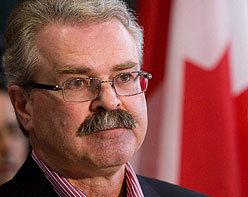In a unanimous decision, the World Trade Organization ruled Friday the U.S.-imposed country-of-origin labelling on meat packaging is discriminatory against Canadian cattle and swine.
Canadian livestock producers hailed the international decision on what they call a protectionist red tape hangover of the BSE crisis.
Ottawa and Canadian producers argue the process, which forces U.S. ranchers and meat packers to handle and label Canadian livestock separately, impeded trade and hurt their competitiveness.
The ruling, said federal Agriculture Minister Gerry Ritz, should break down one of the few remaining barriers thrown up following the BSE crisis that erupted in 2003 and the H1N1 outbreak which rocked pork producers two years ago.
“COOL (country-of-origin labelling) put up a roadblock on that border and this will level that out,” he said of the three-year-old regulations.
The ruling could still be appealed by Washington within the next two months.
“This is only a means to an end and not an end in itself,” said Canadian Cattlemen’s Association President Travis Toews, adding the measures have cost producers hundreds of millions of dollars in lost efficiencies and exports.
Ritz said the requirement had little to do with advancing food safety.
It painfully cost Canadian farmers the export of 5 million hogs to the U.S., said Canadian Pork Council chairman Jurgen Preugschas.
“Those are families, homes and employees that have lost their jobs,” he said.
International Trade Minister Ed Fast said they’ll now step up negotiations with Washington in hopes the U.S. will abide by the WTO ruling and maintain healthy trading relations.
“Just like in families and marriages, there are often little disputes but you resolve them,” said Fast.

Federal Agriculture Minister Gerry Ritz
Source: Canoe.ca
